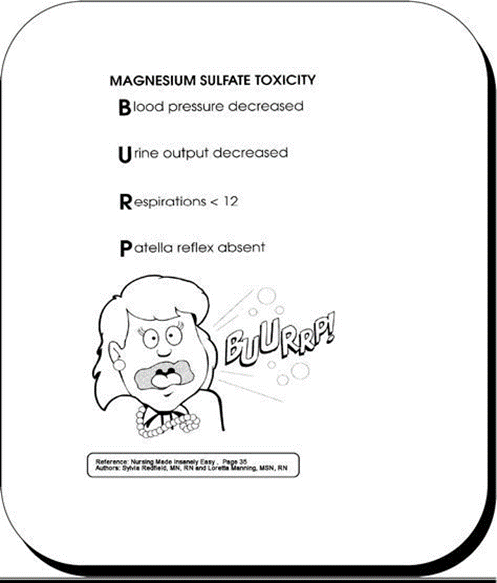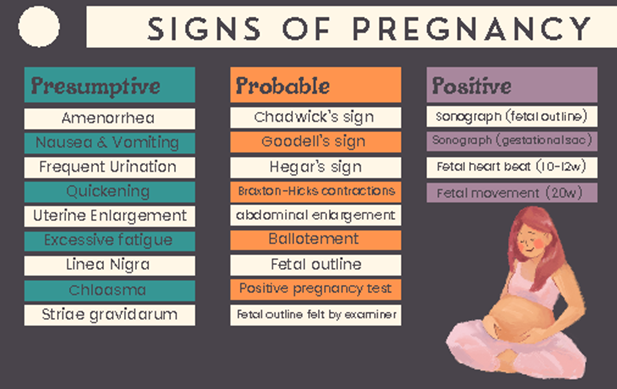A nurse is assessing a client who received magnesium sulfate to treat preterm labor. Which of the following clinical findings should the nurse identify as an indication of toxicity of magnesium sulfate therapy and report to the provider?
Drowsiness
Facial flushing
Nausea
Respiratory depression
The Correct Answer is D
Explanation:
A. Drowsiness: Mild drowsiness is a common side effect of magnesium sulfate therapy and is not necessarily indicative of toxicity. However, severe drowsiness or lethargy can be a sign of magnesium toxicity and should be reported to the provider.
B. Facial flushing: Facial flushing is a common side effect of magnesium sulfate administration and is generally not a sign of toxicity. It is often accompanied by warmth and redness of the skin but is not considered a serious adverse reaction.
C. Nausea: Nausea is another common side effect of magnesium sulfate therapy and is usually mild and transient. It is not typically indicative of toxicity unless it is severe and persistent.
D. Respiratory depression: Respiratory depression is a critical sign of magnesium toxicity. Excessive levels of magnesium can affect neuromuscular function, leading to respiratory muscle weakness and depression. This can result in shallow or slowed breathing, decreased oxygenation, and potential respiratory failure. Respiratory depression is a serious complication that requires immediate intervention, and the nurse should report it to the provider promptly.

Nursing Test Bank
Naxlex Comprehensive Predictor Exams
Related Questions
Correct Answer is D
Explanation
Explanation:
A. "This is a probable sign of pregnancy."
A probable sign of pregnancy is an objective finding observed by a healthcare provider that suggests the likelihood of pregnancy but does not confirm it definitively. Examples of probable signs include positive pregnancy tests (urine or blood tests), changes in the uterus (enlargement, softening), and changes in the cervix (Goodell's sign, Chadwick's sign). Sensations of fetal movement, such as the feeling of the baby moving, are actually presumptive signs of pregnancy rather than probable signs because they can have other explanations and are not definitive proof of pregnancy.
B. "This is a possible sign of pregnancy."
While sensations of fetal movement can be associated with pregnancy, they are more accurately classified as presumptive signs rather than possible signs. Possible signs typically refer to signs or symptoms that could be related to various conditions, including pregnancy, but do not specifically indicate pregnancy on their own. In this context, "possible" may not be as accurate as "presumptive" for describing fetal movement as a sign of pregnancy.
C. "This is a positive sign of pregnancy."
A positive sign of pregnancy is a definitive finding that confirms the presence of a fetus. Examples of positive signs include fetal heartbeat heard by Doppler or ultrasound, fetal movement felt by the healthcare provider (palpation), and visualization of the fetus on ultrasound. Sensations of fetal movement reported by the woman (quickening) are not considered positive signs because they can be subjective and may have other explanations, such as gas or muscle contractions.
D. "This is a presumptive sign of pregnancy."
A presumptive sign of pregnancy is a subjective sign reported by the woman that may indicate pregnancy but can also have other explanations. Examples include amenorrhea (missed periods), nausea and vomiting (morning sickness), breast changes, and sensations of fetal movement (quickening). Sensations of fetal movement are considered presumptive because they are subjective and can be caused by factors other than pregnancy, such as gas or muscle contractions.

Correct Answer is B
Explanation
Explanation:
A. "I know I am at increased risk to develop type 2 diabetes."
This statement indicates an understanding of the increased risk for developing type 2 diabetes after experiencing gestational diabetes. It shows awareness of the long-term implications and the importance of ongoing monitoring and lifestyle management.
B. "I will reduce my exercise schedule to 3 days a week."
This statement is concerning because regular exercise is an essential component of managing gestational diabetes. Exercise helps control blood sugar levels, improves insulin sensitivity, and promotes overall health during pregnancy. The client should not reduce their exercise schedule unless advised by their healthcare provider for specific reasons.
C. "I will take my glyburide daily with breakfast."
Glyburide is an oral medication used to help control blood sugar levels in some cases of gestational diabetes. Taking it with breakfast can help optimize its effectiveness. This statement indicates an understanding of medication management.
D. "I should limit my carbohydrates to 50% of caloric intake."
Limiting carbohydrates is often a key part of managing gestational diabetes, as it can help control blood sugar levels. However, the specific percentage of carbohydrate intake may vary based on individual factors and should be determined in consultation with a healthcare provider or registered dietitian.
Whether you are a student looking to ace your exams or a practicing nurse seeking to enhance your expertise , our nursing education contents will empower you with the confidence and competence to make a difference in the lives of patients and become a respected leader in the healthcare field.
Visit Naxlex, invest in your future and unlock endless possibilities with our unparalleled nursing education contents today
Report Wrong Answer on the Current Question
Do you disagree with the answer? If yes, what is your expected answer? Explain.
Kindly be descriptive with the issue you are facing.
